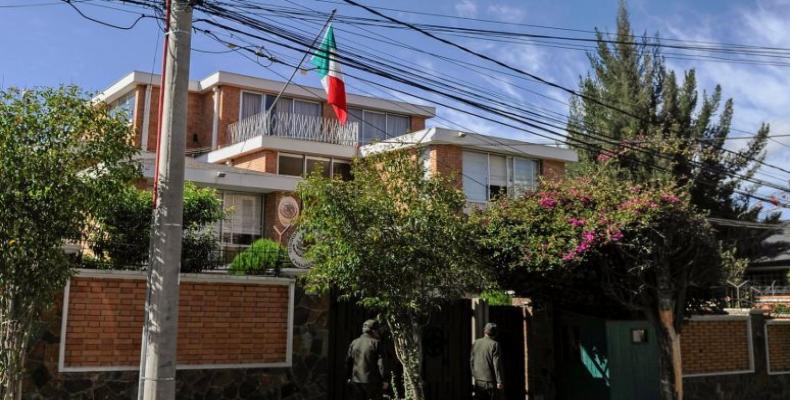Mexico City, December 24 (RHC)-- Mexico’s Foreign Affairs Ministry said Monday that it was “deeply concerned” about “excessive” surveillance of the Mexican ambassador’s residence and Mexican embassy in Bolivia by about 150 Bolivian intelligence and security service personnel. Mexico said the Bolivians were “intimidating” diplomatic staff and attempted to “detain and inspect” the ambassador’s vehicle on Monday.
Bolivia's police under the de-facto regime has effectively surrounded the Mexican embassy in La Paz, where Mexico is providing asylum to some 20 officials from Evo Morales government.
The Undersecretary for Latin America and the Caribbean of the Mexican Foreign Ministry Maximiliano Reyes Zuñiga warned that the Bolivian de-facto government's illegal activities are not in compliance with the Vienna Convention.
"We repudiate that the de facto government in the style of the military dictatorship violates the Vienna Convention on Diplomatic Relations by enclosing the Mexican residence with police officers and using drones that violate their airspace to intimidate and endanger the security of the asylees," exiled Bolivian President Evo Morales tweeted on Monday.
More specifically, Mexico demanded that Bolivia respect the obligations of the Bolivian State described in Article 22 of the Vienna Convention on Diplomatic Relations, which establishes that the buildings or properties of diplomatic missions are inviolable and that agents of the host state may not enter them without the consent of the head of the mission.
International agreements also state that the host state has a special obligation to take all appropriate measures to protect the mission against any intrusion or damage and to avoid disturbing the tranquillity of the mission or impairing its dignity. Furthermore, the premises of the mission and its property may not be searched, detained or subjected to any measure of execution.
According to teleSUR's correspondent in Bolivia Freddy Morales, the current presence of two groups of police, one of four and one of six officers, outside the Mexican embassy is "quite unusual." There was also a police vehicle parked and two more arrived shortly after, a level of surveillance that does not happen at other embassies or diplomatic residences.
Mexican President Andres Manuel Lopez Obrador granted asylum to Morales after the right-wing coup pushed the Indigenous president to resign. A number of other progressive governments of the region have been reluctant to recognize the self-proclaimed President Jeanine Añez as the rightful leader of Bolivia.


